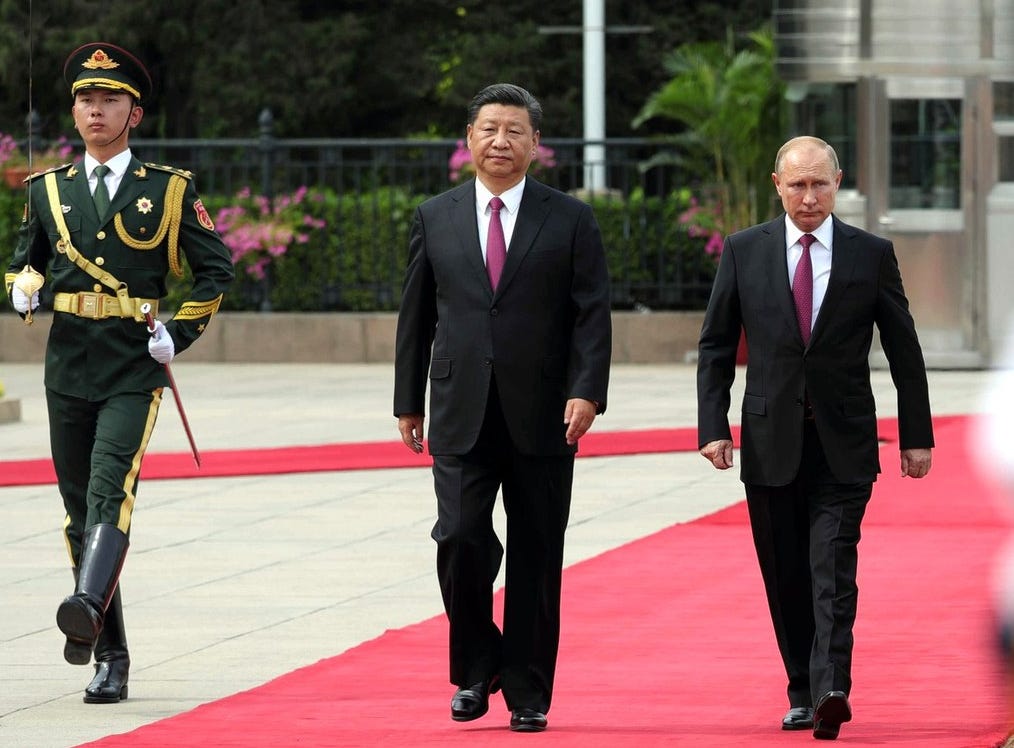Who said what?
According to Russia, it still has China's support for its invasion of Ukraine
Russian President Vladimir Putin on a state visit to China, 2018. Photo: WikiCommons.
Says Russia, appears to be key.
An official statement on Chinese third-in-power Li Zhanshu’s meeting with Russian president Vladimir Putin contrasts somewhat with China’s official Xinhua reporting on the meeting.
According to the statement (English) by Russia’s State Duma, Li said”
‘China understands and supports Russia on issues that represent its vital interests, in particular on the situation in Ukraine … We fully understand the necessity of all the measures taken by Russia aimed at protecting its key interests, we are providing our assistance.’
Xinhua, on the other hand, reports (English):
Li conveyed cordial greetings and best wishes from Chinese President Xi Jinping to Putin. He said … Political mutual trust, strategic coordination and pragmatic cooperation between the two countries have reached an unprecedented level, setting a good example of good-neighborly friendship and win-win cooperation between major countries and neighboring countries.
In other words, according to the Chinese version of events, Li waffled in lukewarm CCP double-talk but did manage to bring up Taiwan:
Li thanked the Russian side for firmly supporting China on the Taiwan question.
Expect more political theater when CCP General Secretary Xi Jinping meets Putin at the Shanghai Cooperation Organization summit in Uzbekistan later this week amid a potentially devastating (for Russian forces) counter-offensive by Ukraine to retake lost ground.
Whatever reservations the Chinese leadership may have about possibly being on the wrong side of history in the Ukraine conflict, Xi Jinping will likely give the appearance of being firm and doubling down on support for Russia without saying so explicitly.
It’s official
China refuses to cooperate with the United Nations.
That is, after the release of a much-delayed (and damning) report on the situation in the Xinjiang Uyghur Autonomous Region (former East Turkestan).
Reports Reuters:
China's ambassador to the United Nations in Geneva said on Friday that Beijing would not cooperate with the U.N. human rights office following the release of a long-awaited report on alleged human rights abuses in the far western region of Xinjiang
Meanwhile, ChinaDiction was unable to confirm social media rumors (#StarvationGenocide #UyghurGenocide) that Uyghurs in Xinjiang are being targeted by weaponized starvation in anti-Covid-19 lockdowns, but cries for help from Ili Kazakh Autonomous Prefecture in northern Xinjiang (actually Ghulja, or Yining City), which has been locked down for up to 40 days, appear to be genuine.
Ili (or Yili), one Uyghur source said in a phone interview, is a multicultural mix of Uyghurs, Han and Kazakhs, adding that whether the Han residents had privileged lockdowns compared to their minority neighbors was unknown.
Emergency loans abroad rival IMF
The Financial Times (paywall) reports that China has made “secretive emergency loans” to countries in perilous financial straits in recent years, making it “a formidable competitor of the western-led IMF.”
The bailouts represent a pivot from the huge infrastructure loans China has extended over nearly a decade as part of its $838bn Belt and Road Initiative, a programme that made it the world’s biggest financer of public works, eclipsing the World Bank.
Three of the largest recipients of China’s rescue lending have been Pakistan, Sri Lanka and Argentina, which together have received $32.83bn since 2017, according to data compiled by AidData, a research lab at William & Mary, a university in the US.
Analysts said in most cases, the objective of its emergency lending is to prevent defaults on infrastructure loans extended under the Belt and Road Initiative. More broadly, the lending seeks to ward off balance of payments problems that can develop into full-blown crises such as those endured by Asian countries in 1997 and Latin America in the 1980s.
Huge on Chinese social media
Li Yifeng playing Mao. Social media screen-grab.
Over to the highly recommended What’s on Weibo, which reports that actor, singer and “brand ambassador for the the Ministry of State Security” Li Yifeng has been “detained in Beijing for soliciting prostitutes.”
The Chinese language hashtag to that effect has received some 3 billion views, which is obviously impressive, but also a career-stopper for a state-endorsed celebrity in China.
The Greater Sinosphere
Hong Kong
Speech therapists get 19 months, stand firm with sheep
Not from the books in question – more ‘nature raw in tooth and nail.’ Illustration: WikiCommons.
A judge has ruled that the five speech therapists under trial for sedition over publishing illustrated children’s books about wolves and sheep are guilty of “brainwashing” young minds, according to Radio Free Asia.
District Judge Kwok Wai-kin meted out jail terms to Lorie Lai, Melody Yeung, Sidney Ng, Samuel Chan and Fong Tsz-ho on Saturday, three days after he found them guilty of conspiring to print, publish, distribute and display three books with seditious intent between June 2020 and July 2021.
In a 67-page-long verdict handed down on Wednesday, Kwok ruled the children’s books were seditious publications. He said the first book about sheep guarding their village against the wolves implied that the Chinese authorities were wolves, while the Hong Kong chief executive was a wolf who “masqueraded as a sheep” and was instructed by the “Wolf-chairman.”
Such a plot would lead readers, some of whom could be as young as four years old, to hate the Chinese authorities by causing them to believe that the Chinese government was “coming to Hong Kong with the wicked intention of taking away their home.”
The speech therapists – who only have around one more month to serve of their 19-month sentences – were unrepentant.
‘I do not regret my choice, and I hope I can stand on the side of the sheep from the beginning till the end. My only regret is I did not get to publish more illustrated books before being arrested,’ she told the court.
Some court attendees sobbed after Yeung finished her speech.
Hundreds queue at British Consulate to lay bouquets
The floral memorials to Queen Elizabeth II outside the British consulate began the day after her death was announced with just a couple of dozen bouquets and have continued to grow in what some might read as a solemn rebuke to the “China über alles” regimen that is the order of the day.
For the moment the queues and the bouquets are being tolerated.
Taiwan
The Ukraine gambit
Taiwan representative (ambassador) to the US Hsiao Bi-khim, pictured above, led Taiwan’s delegation to Ukraine. Photo: Simon Liu/Office of the President.
China is pressuring Ukraine not to drift wayward and “become friends” with Taiwan, according to Focus Taiwan.
Ukrainian lawmaker Oleksandr Merezhko told Taiwan’s Central News Agency (CNA) that China applied a “Soviet approach” to pressure him into not going ahead and establishing a “Taiwan friendship caucus” in the Ukraine parliament.
Merezhko claims to have turned down an invite by the Chinese embassy in Ukraine to meet with Ambassador Fan Xianrong, saying that Fan had “refused to see him and his colleagues when they requested a meeting in March to discuss opening humanitarian corridors for civilians in Ukraine, amid Russia's relentless shelling.”
He noted that CCP General Secretary Xi aligned China with Russia, declaring a “no limits” friendship with Putin before the war began in Ukraine on February 24.
Merezhko added that Beijing also made “the unfathomable suggestion” that the United States is to blame for Russian President Vladimir Putin's decision to invade Ukraine.
On meeting the Taiwan delegation:
"There was immediate chemistry between us because we understand each other," Merezhko said, recalling his meeting with the Taiwanese delegation that was led by Taiwan's representative to the U.S. Hsiao Bi-khim (蕭美琴).
"I really appreciated their support. They view our struggle for freedom as their war," Merezhko said, adding that it was his first interaction with Taiwanese politicians, including then Deputy Foreign Minister Tseng Ho-jen (曾厚仁) and Democratic Progressive Party legislators Chiu Chih-wei (邱志偉) and Lin Ching-yi (林靜儀).
It’s difficult not to conclude – at least for the moment – that Xi and Putin’s alliance of autocrats is being outflanked like Russian troops in a Ukrainian oblast.
Ukraine conflict puts Taiwan nuclear plants on alert
Beachside view of Maanshan nuclear plant, Hengchun. Photo: Cheng-en Cheng; WikiCommons.
Energy Intelligence reports that in the wake of fighting in the vicinity of Zaporozhye nuclear plant in southeastern Ukraine, Taiwan is making changes to its annual nuclear safety drills.
This was revealed at a news conference ahead of a two-day drill Sep. 6-7 at the Maanshan nuclear power plant on the island's southern tip. The exercise included measures aimed at responding to ‘specific severe incidents,’ including possible damage to the plant in a future military conflict with the People`s Republic of China (PRC), AEC Deputy Minister Liu Wen-chung said at the Sep. 2 news conference. In testing responses to ‘complex’ or ‘combined’ disasters, parts of the program were designed to incorporate lessons from the Russian-Ukrainian conflict and the ongoing crisis at the six-unit Zaporozhye plant where shelling has damaged the plant and lead to a total loss of external power.
The threat of an attack triggering a meltdown will diminish with the retirement of the 985 MW Kuosheng-2 next March and the two Maanshan units in June 2024 and May 2025, but that risk is among a multitude of reasons why prospects for continued operation of Maanshan beyond it scheduled closure are “not high," according to senior AEC executives who spoke with Energy Intelligence. The center-left Democratic Progressive Party (DPP) administration of President Tsai Ing-wen maintains that “even one nuclear disaster will ruin Taiwan," said one. With the retirement of Maanshan, Taiwan will attain a core DPP “energy transition” goal of achieving a “nuclear free homeland.”
Tibet
Blood and DNA
Human Rights Watch/WeChat photograph (September 10, 2021) of police allegedly taking blood for DNA in Yushu (a town that always seems to cop it for something) in Qinghai Province, formerly part of greater Tibet.
According to Human Rights Watch, the Chinese authorities are “arbitrarily” collecting “DNA from residents in many towns and villages throughout the Tibet Autonomous Region (TAR).”
The available information indicates that people cannot decline providing their DNA and that police do not need credible evidence of any criminal conduct. A report from Lhasa municipality in April 2022 stated that blood samples for DNA collection were being systematically collected from children at kindergartens and from other local residents. A report from a Tibetan township in Qinghai province in December 2020 stated that DNA was being collected from all boys aged 5 and above.
These mass DNA collection drives appear to be taking place in all seven prefectures or municipalities in the TAR, which covers the western part of the Tibetan plateau.
Coda
Any questions?
Questions from the press? “What’s to ask?” reads the Chinese tweet. “The answers are all nonsense, officialese, empty words, falsehoods. Finally, reporters get it and they’re ‘laying flat,’ nothing to ask. The Ministry of Foreign Affairs spokesperson also has nothing to say, no way to dump the carefully prepared answers, so she calls the conference to an early close.”









